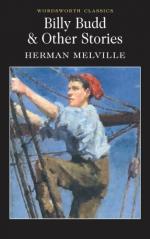|
This section contains 5,605 words (approx. 19 pages at 300 words per page) |

|
SOURCE: “Billy Budd: Two Concepts of Nature,” in American Literature, Vol. XXIX, No. 3, November, 1957, pp. 249–62.
In the following essay, Noone finds connections between Billy Budd and Jean-Jacques Rousseau's and Thomas Hobbes's version of the primitive man.
Billy Budd, the last will and testament of Herman Melville, has long been a source of contention among his intellectual heirs. A simple story cloaking a complicated structure and spotted with apparent digressions, it inevitably stimulates the curiosity of the speculative intellect. In response to this stimulus a variety of interpretations ambiguously testifies to its richness, confusion, or both. This [essay], risking further confusion, proposes still another theory in the belief that within its framework other interpretations may find their justifications as elaborations of its several parts.
I
Perhaps the first impression a student receives upon reading Billy Budd, Foretopman is that it reflects something of that clash of ideas which gave...
|
This section contains 5,605 words (approx. 19 pages at 300 words per page) |

|


